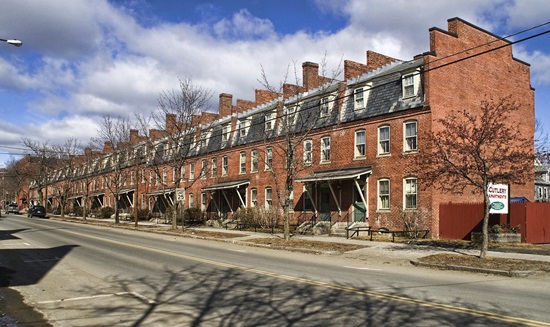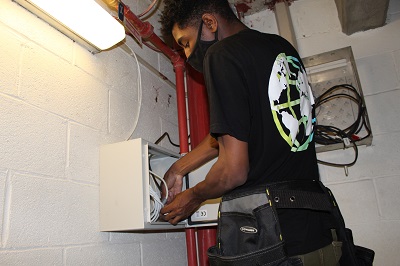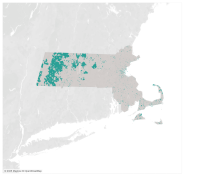
Massachusetts and New York officials hope to entice affordable housing property owners with new grant programs that would pay the retrofitting costs to expand high-speed Internet connectivity into decades-old affordable housing developments.
The programs aim to focus on the multitude of multi-dwelling units (MDUs) in those states, particularly housing developments built before the advent of the Internet.
With property owners and Internet service providers (ISPs) often reluctant to pay the costs of getting these buildings up to broadband speed, Massachusetts and New York have launched initiatives – using a portion of their federal broadband funds – to chip away at the digital divide in housing developments where a significant number of tenants live in buildings not wired to support reliable broadband or where the service is not affordable, thanks to agreements with monopoly providers.

New York Bytes Into Broadband Affordability
In December, New York Governor Kathy Hochul’s office announced the state’s ConnectALL Office (CAO) was setting aside $100 million New York State received from the federal Capital Projects Fund (courtesy of the American Rescue Plan Act) to bring broadband connectivity to 100,000 affordable housing units across the Empire State.
In announcing New York's Affordable Housing Connectivity Program, Hochul said:
“With work, school, and essential government services going digital, affordable homes need affordable, reliable broadband, and this funding will help bolster our efforts to build housing equipped with the basic tools that New Yorkers need to succeed.”
To access the program, affordable housing property owners across the state will first need to complete an online “Building Conditions Self-Assessment (“BCSA”).
Then, “CAO will review the information provided by property owners and other information including federal and state broadband maps to prioritize properties for participation in this program. After this prioritization process, CAO will aggregate property data to assemble portfolios of properties,” according to program guidelines.
That process will help the ConnectALL Office determine which properties will be prioritized for “no-cost broadband upgrades to their building.” Once that has been determined, “ConnectALL will pair eligible properties with the best proposals from Internet Service Providers to complete the installation.”
Mass Movement Toward Better Broadband in Affordable Housing
In Massachusetts a similar initiative – known as the Residential Internet Retrofit Program – was announced earlier this month.
Using $22 million of the $175 million in CPF funds the Commonwealth received, the program will be administered by the Massachusetts Broadband Institute (MBI).

Officials say the program will pair ISPs with property owners “to upgrade in-building telecommunications wiring, equipment, and infrastructure within older housing developments.”
In a press announcement, the state Secretary of Economic Development Yvonne Hao said the program is part of the state’s effort to ensure every household has access to broadband because “our economic future depends on high-quality Internet access for all, especially for low-income populations who have been historically overlooked and disproportionately impacted by the digital divide.”
“The Retrofit Program takes an equitable approach to addressing the root causes of low-quality Internet service in public and affordable housing.”
MBI director Michael Baldino noted that a significant part of the state’s public housing units are more than 50 years old, adding that “low-income families in these buildings face barriers to accessing the speeds offered by broadband service if the wiring in their apartments pre-dates the Internet age.”
The program will target 22,000 affordable housing units across the state and can work in tandem with another program known as the Gap Networks Grant Program, which was launched by MBI in October 2023.

Affordable housing property owners interested in leveraging the program are being asked to submit an “expression of interest via MBI’s online form” so state officials can gauge interest and get a more granular sense of the size, scope, and cost of specific retrofit proposals. Later this spring, MBI will issue a Request For Information (RFI) from ISPs, which will help officials put together a formal Request For Proposal (RFP) sometime later this year.
Having recently launched the state’s BEAD challenge process (to help state officials better pinpoint which households do not have access to high speed Internet service), MBI officials anticipate the retrofit program will be rolled out in phases with quarterly RFPs issued along the way with an updated list of eligible locations statewide.
State Senator Michael Moore lauded the program, pointing to the role that nonprofits and nontraditional broadband providers might play:
“Greater access to broadband will bring more opportunities to individuals and families living in these units and ensure fast, reliable Internet is for everyone – regardless of their zip code or socioeconomic status. I look forward to continuing the legislature’s work with nonprofits, Internet service providers, and others to expand high speed Internet to every Bay Stater in every corner of the Commonwealth.”
Meanwhile, State Representative Tricia Farley-Bouvier added something most federal state lawmakers have been loathe to admit, or act on:
“Access to (the) Internet should be guaranteed and protected in the same manner as other utilities like water, heat, and electricity. The Residential Internet Retrofit Program … is a key step towards ensuring all our commonwealth’s residents have access to what should be a public utility.”
Promising Start to Challenging Issue
The retrofit programs emerging in New York and Massachusetts are a promising start to dealing with broadband affordability challenges, especially in light of two realities: first, urban and suburban areas are unlikely to see much, if any, federal BEAD investments (Congress designed those funds to build new networks in mostly rural communities).

Secondly, targeting MDUs (or MTEs – Multi-Tenant Environments) provides a bigger bang for the buck because households that struggle to pay for Internet service tend to be concentrated in affordable housing developments.
Even in places where no such programs exist at the state level, the idea of targeting MDUs with better broadband has met with some success. In Baltimore, Project Waves was able to deploy fiber to a half-dozen low-income apartment buildings and deliver no-cost broadband service using the buildings existing cable wiring without the need for an entire retrofit.
These kinds of programs take on even more significance in the face of an expiring Affordable Connectivity Program (ACP) that 23 million Americans have been counting on to pay for Internet service in a nation where subscribers pay among the highest prices of any developed nation in the world.
Still, there are no guarantees affordable housing property owners and private ISPs will participate. In Nevada, for example, state broadband officials launched the Low-Income MDU Connectivity Program in January 2023 using $55 million of that state's CPF funds. However, according to Telecompetitor, not a single grant has been issued to date.
An inquiry sent to Nevada’s Office of Science, Innovation and Technology (OSIT), which administers the program, was not immediately answered (as we were hoping to confirm or refute rumors circulating in the broadband world that building owners and property managers simply weren’t very interested).
The Bulk of The Affordability Issue
Irrespective of the state in which these programs are launched, there are challenges with broadband access in MDUs that officials will still need to contend with – not the least of which are bulk service agreements, which have been the subject of intense industry debate for years. Under those arrangements, property owners sign exclusive deals with an ISP and include the cost of Internet service in the rent.

However, as part of the Biden administration’s push to promote competition in the economy, the FCC is currently considering new rules that would ban typical bulk service agreements, “allowing tenants to opt out of bulk billing arrangements.”
When the FCC sought public comment on the issue, Public Knowledge and Consumer Reports submitted comments noting how “landlords and Internet service providers have exploited loopholes to … create de facto monopolies in buildings. The resulting lack of competition increases prices and restricts the choices available to residential and business tenants alike.”
We have been told by FCC watchdogs that they expect the agency will likely prohibit bulk billing arrangements but only in instances where residents don’t have the right to “opt-out,” leaving the “opt-in” model as a permissible one that would, in effect, maintain the status quo and do nothing to prohibit MDU arrangements that do not give tenants a choice in who they can get Internet service from.
In anticipation of the FCC possibly banning bulk service agreements, MDU owners who favor the status quo would likely consider an “opt-in” model in which they retain an exclusive service agreement with a single ISP but then pay the ISP a monthly amount for all of the units in their housing developments.
In that scenario, instead of passing on the costs of Internet service to the tenants as part of the rent, the ISP would pay the MDU owner a sizable percentage of the revenues the ISP gets from tenants who “voluntarily” subscribe for service.

Considering how important Internet service has become, ISPs with exclusive agreements can expect most tenants would “opt-in,” which would mean landlords or property managers could expect roughly the same amount of profit under an “opt-in” arrangement as they would get from traditional bulk service agreements.
The implications of this are not hard to imagine: states may find it difficult attracting property owners to apply for retrofit grants if there is a requirement that multiple ISPs could deploy service to individual units in the same housing development, which would threaten the potential profit that can be made from exclusive agreements.
Wary of wading into the issue, the guidelines for New York's Affordable Housing Connectivity Program suggest the state will not make the grants contingent on whether a bulk service agreement is in place or not.
The guidelines note that New York’s ConnectALL office “cannot provide legal advice and/or direction regarding the terms, conditions and/or implications of a contract between a property owner and an ISP.”
“Owners with exclusive contracts with an ISP may, at their option and discretion independently of any guidance or involvement from ConnectALL, choose to consider reviewing the terms of the contract to determine if the contract will expire in the near future, or to assess the viability and desirability of paying any cost associated with buying out the contract. Owners with such contracts could also potentially consider, at their option and discretion independently of any guidance or involvement from ConnectAll, approaching their current provider to encourage the ISP to apply for grant funding via the Affordable Housing Connectivity Program.”
As the FCC considers how to deal with bulk service agreements, state and local governments would be wise to consider their own policies much like they do with the enforcement of building codes related to electric wiring and plumbing. In Oakland and San Francisco, for example, city councilors passed ordinances that require MDU owners to allow multiple providers in.
At the very least, states who offer broadband retrofit grants should be aware they will be doing so in an environment in which MDU owners are incentivized to enter into exclusive deals and may be more concerned with maximizing rental income than they are in ensuring tenants have a choice among providers.
Header image of affordable housing development in Queens NY courtesy of Flickr user Matt Green, Attribution-NonCommercial-ShareAlike 2.0 Generic
Inline of the Crocker Cutlery apartments in Turner Falls MA courtesy of Flickr user Liz West, Attribution 2.0 Generic
Inline image of lease agreement courtesy of Gharpedia, Attribution-ShareAlike 3.0 Unported







